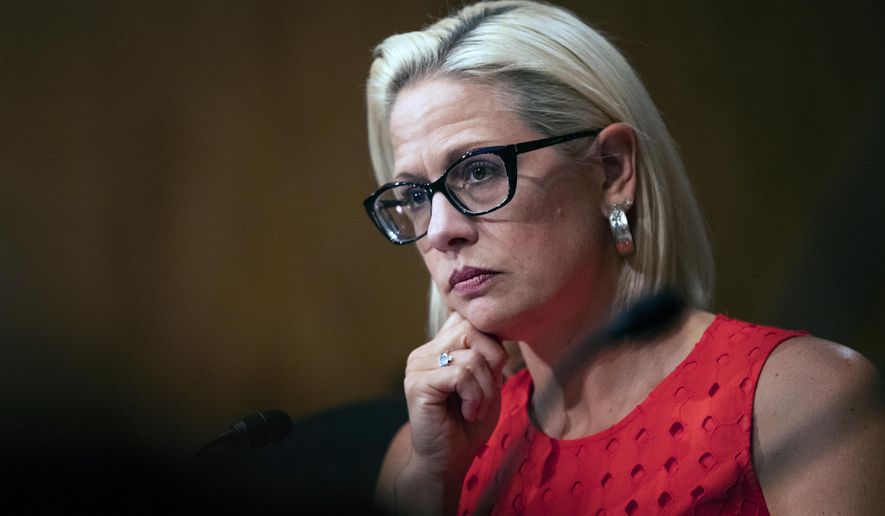Moderate Senate Democrats are preparing to exert their influence over President Biden’s $3.5 trillion party-line spending package, exposing the ideological rift that threatens to derail the massive proposal.
The divisions were evidenced Wednesday only hours after all 50 Senate Democrats backed a resolution to start drafting the bill. Despite voting for the resolution, which set the package’s top-line spending numbers and priorities, Sen. Joe Manchin III of West Virginia expressed reservations about the size and scope of the legislation.
“Over the past year, Congress has injected more than $5 trillion of stimulus into the American economy – more than any time since World War II – to respond to the pandemic,” Mr. Manchin said. “The challenge we now face is different: Millions of jobs remain unfilled across the country and rising inflation rates are now an unavoidable tax on the wages and income of every American.”
Mr. Manchin, who was recently booed for bringing up the deficit during a Senate Democratic luncheon, added that it would be “simply irresponsible to continue spending at levels more suited to respond to a Great Depression or Great Recession.”
Sen. Kyrsten Sinema, Arizona Democrat, has raised similar concerns. Ms. Sinema has argued that $3.5 trillion is too much to spend, but like Mr. Manchin, voted for the budget resolution anyway.
The divisions underscore the tenuous situation facing Democrats as they begin writing the package.
Dubbed “human infrastructure,” the $3.5 trillion package is being pitched by far-left Democrats as the most “consequential” expansion of the federal government since the New Deal era.
“For too many decades, Congress has ignored the needs of the working class, the elderly, the children, the sick and the poor,” said Senate Budget Committee Chairman Bernard Sanders, a self-described socialist from Vermont. “Now is the time for bold action.”
Mr. Sanders, who will oversee the package throughout the legislative process, admits it amounts to something of a liberal wishlist.
“Our political task is not just to improve life for working families in terms of decent income, health care, education, etc.,” he said. “It is to change the political paradigm so that people demand their full rights as human beings, and not just scraps from the table.”
The package is slated to include amnesty for illegal immigrants, free community college, job training for felons and new climate change regulations. Democrats also plan to use the legislation to expand Medicare and Medicaid, provide free universal pre-kindergarten, and create a civilian climate corps for unemployed youth.
To pay for all of the new spending, Democrats are eyeing a repeal of former President Donald Trump’s signature tax cuts as well as a “carbon polluter import fee.”
“We’re going to make sure that those at the top, those multinational corporations and the wealthiest individuals are going to pay their fair share,” said Senate Finance Committee Chairman Ron Wyden, Oregon Democrat. “That’s going to make the tax code more progressive and fairer.”
Such ambitions, however, need the support of Mr. Manchin and Ms. Sinema since the Senate is split 50-50 between the two parties.
That reality stems from the fact that Democrats are planning to bypass Republicans and pass the $3.5 trillion package via budget reconciliation. The process allows spending measures to avoid the Senate’s 60-vote filibuster threshold and pass with a simple majority of 51 votes.
“We have labored for months and months to reach this point, and we have no illusions,” said Senate Majority Leader Charles E. Schumer, New York Democrat. “Maybe the hardest work is yet to come, but we are united in a desire to get it done.”
Give the narrow path for reconciliation, many expect Mr. Manchin and Ms. Sinema to exert their influence to moderate the package. Few, though, say that will play out in the open. Instead, the senators are likely to negotiate behind the scenes using both their official positions and their unofficial status as key swing votes.
Mr. Manchin, in particular, is set to play a leading role. As chairman of the Senate Energy and Natural Resources Committee, he will be responsible for helping write any new climate change regulations. His committee is also tasked with figuring out how to spend $198 billion of the package’s $3.5 trillion total.
“By the time they’re done drafting the bill, Manchin is going to be invested in its passage,” said a senior Democratic aide, who requested anonymity. “He’ll push the whole bill to the center a bit, but he’ll get on board.”
Mr. Schumer echoed that sentiment during a Capitol Hill press conference.
“We have a diverse caucus. We show respect … Everyone knows that, so that does not mean people don’t fight for their beliefs but at the end of their day, we have to come together,” the New York Democrat said. “Thus far, we have. Is it going to be easy on reconciliation? Absolutely not. But if the past is prologue, we have a decent chance.”
It is not clear, though, if a watered-down reconciliation package would secure the support of progressives. Far-left Democrats in both chambers have threatened to withhold support if their interests are not met, especially on climate change.
“This reconciliation bill is the down payment towards the bold agenda that Americans want and need,” said Rep. Pramila Jayapal, a Washington Democrat who chairs the 95-member Congressional Progressive Caucus.
• Haris Alic can be reached at halic@washingtontimes.com.




Please read our comment policy before commenting.